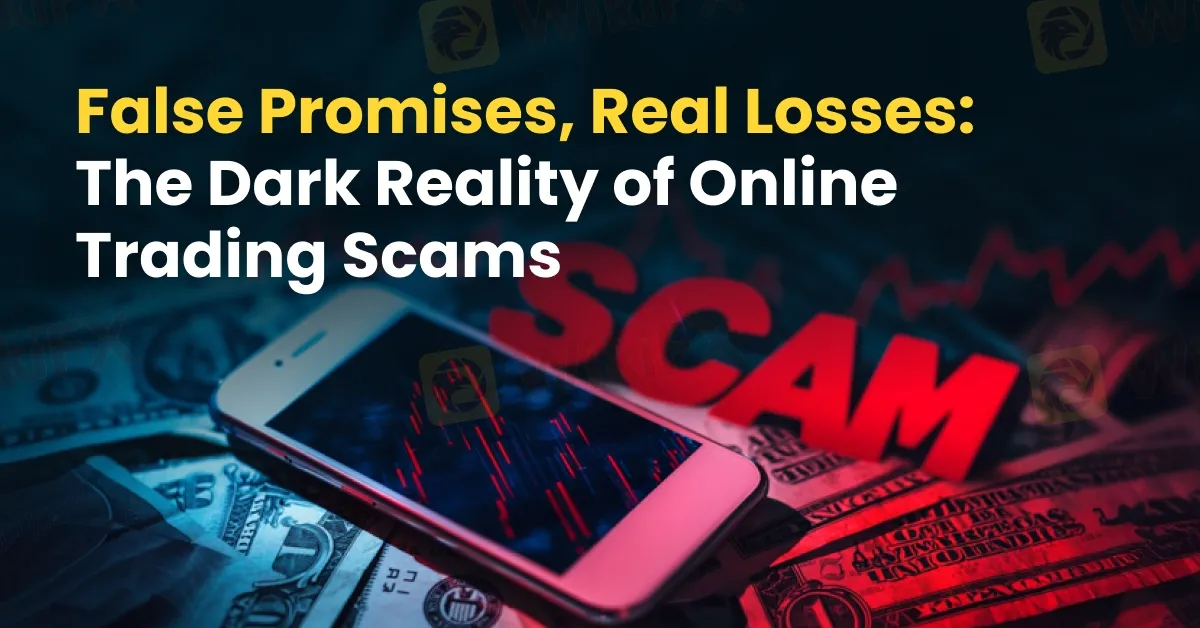简体中文
繁體中文
English
Pусский
日本語
ภาษาไทย
Tiếng Việt
Bahasa Indonesia
Español
हिन्दी
Filippiiniläinen
Français
Deutsch
Português
Türkçe
한국어
العربية
False Promises, Real Losses: The Dark Reality of Online Trading Scams
Abstract:In an era where financial independence is marketed as just a few clicks away, online trading platforms have become fertile ground for a dangerous breed of digital deception with seductive fake promises including quick profits, little effort, and exclusive insights.

In an era where financial independence is marketed as just a few clicks away, online trading platforms have become fertile ground for a dangerous breed of digital deception. For every legitimate brokerage or trading educator, a legion of scammers lurks behind polished websites and persuasive ads, armed with a calculated playbook aimed at exploiting retail traders' hopes, inexperience, and FOMO (fear of missing out).
The promise is seductive: quick profits, little effort, and exclusive insights. But the reality for many retail investors is sobering. Rather than riding a bull market to financial freedom, they find themselves ensnared in a bear trap of manipulation, misdirection, and monetary loss.

Fraudsters frequently pose as trading gurus or representatives of well-known financial institutions. Leveraging doctored certifications, fake LinkedIn profiles, or AI-generated videos, they present a veneer of legitimacy. Phrases like “regulated by top-tier authorities” or “endorsed by global financial bodies” are liberally used without verifiable evidence. For victims, this false sense of security often lowers their guard.

Perhaps the most tell-tale sign is the promise of unrealistic returns. Claims of 20%, 50%, or even 100% profit in days or weeks are common bait. These are often backed by photoshopped account statements or staged testimonials. Initially, small withdrawals are permitted to build trust but once larger sums are deposited, communication ceases, and the traders funds disappear.

Scammers thrive on urgency. Limited-time offers, countdown timers, and exclusive ‘VIP’ opportunities are used to push users into hasty decisions. Victims are told they must “act now” to secure their financial future while simultaneously discouraging due diligence in the process.

Sophisticated schemes go further by creating clone websites or apps that mirror legitimate trading platforms. Victims unknowingly enter personal data or deposit funds into fraudulent accounts, believing they're engaging with trusted services. By the time discrepancies are noticed, the fraudsters have vanished.

A cruel twist in this saga is the follow-up scam. After suffering losses, victims are contacted by so-called “recovery experts” promising to retrieve lost funds, typically for a fee. Desperation often leads victims to fall twice.
While regulation is catching up, vigilance remains a trader's best defence. Investors should verify licences with financial authorities, be sceptical of pressure tactics, and avoid trading through social media channels or messaging apps. Crucially, if it sounds too good to be true, it likely is.
The digital trading revolution has empowered millions. But where there's money, there's malice. As scammers evolve in sophistication, so too must the awareness of retail traders. Education, scepticism, and regulatory enforcement are the only real tools to counter this enduring threat.

As incidents like this become increasingly common, tools such as WikiFX can play a vital role in helping individuals verify the legitimacy of brokers and financial platforms. WikiFX offers an extensive database of global broker profiles, regulatory status updates, and user reviews, enabling users to make informed decisions before committing to any financial investment. Its risk ratings and alerts for unlicensed or suspicious entities help investors easily spot red flags and avoid potential scams. By using tools like WikiFX to research a broker's background, individuals can safeguard their hard-earned savings and reduce the risk of falling victim to fraudulent schemes.

Disclaimer:
The views in this article only represent the author's personal views, and do not constitute investment advice on this platform. This platform does not guarantee the accuracy, completeness and timeliness of the information in the article, and will not be liable for any loss caused by the use of or reliance on the information in the article.
Read more

WikiFX Broker Assessment Series | TOPONE Markets: Is It Trustworthy?
In this article, we will conduct a comprehensive examination of TOPONE Markets, delving into its key features, fees, safety measures, deposit and withdrawal options, trading platform, and customer service. WikiFX endeavours to provide you with the essential information required to make an informed decision about utilizing this platform.

Interactive Brokers Adds Ping An of China ETF to No-Fee Program
Interactive Brokers now includes Ping An of China CSI HK Dividend ETF in its no-transaction-fee program, offering investors low-cost access to Hong Kong’s top dividend-paying stocks.

eToro Broker Review: Something You Need to Know
As a reputable broker that has offered services for decades, eToro has played a significant role in the industry. However, it doesn’t mean it suits every trader. Besides, WikiFX has recently received more than 40 complaints against a broker called eToro. In today’s article, we will offer you a comprehensive review of this broker so that you can have a close overall look at eToro.

Judge Reviews Sanctions Against CFTC in My Forex Funds Fraud Case
A New Jersey judge reviews sanctions against the CFTC after a special master accused the agency of bad faith in its fraud case against My Forex Funds and CEO Kazmi.
WikiFX Broker
Latest News
Short-Term Pressure Mounts on Gold as Risk Sentiment Improves
How Will the U.S.-China Trade Deal Affect the Dollar and Global Markets?
Radiant DAO Proposes Compensation Plan for Wallet Losses
BitGo Secures MiCA License, Expands Crypto Services Across the EU
Big Changes at Saxo Bank: What Traders and Partners Need to Know
Traders Warned to Stay Alert Amid Growing Exposures for INGOT Brokers
WELTRADE's transformation from Reliable to a Problematic Broker
WikiFX “Elite’s View on the Challenge: Dialogue with Global Investment Leaders” Concludes Successful
Plus500 Review 2025: Trusted CFD Broker with Top Features Unveiled
Plus500 Q1 2025: Strong Growth Amid Trade War, Mehta Acquisition
Currency Calculator



